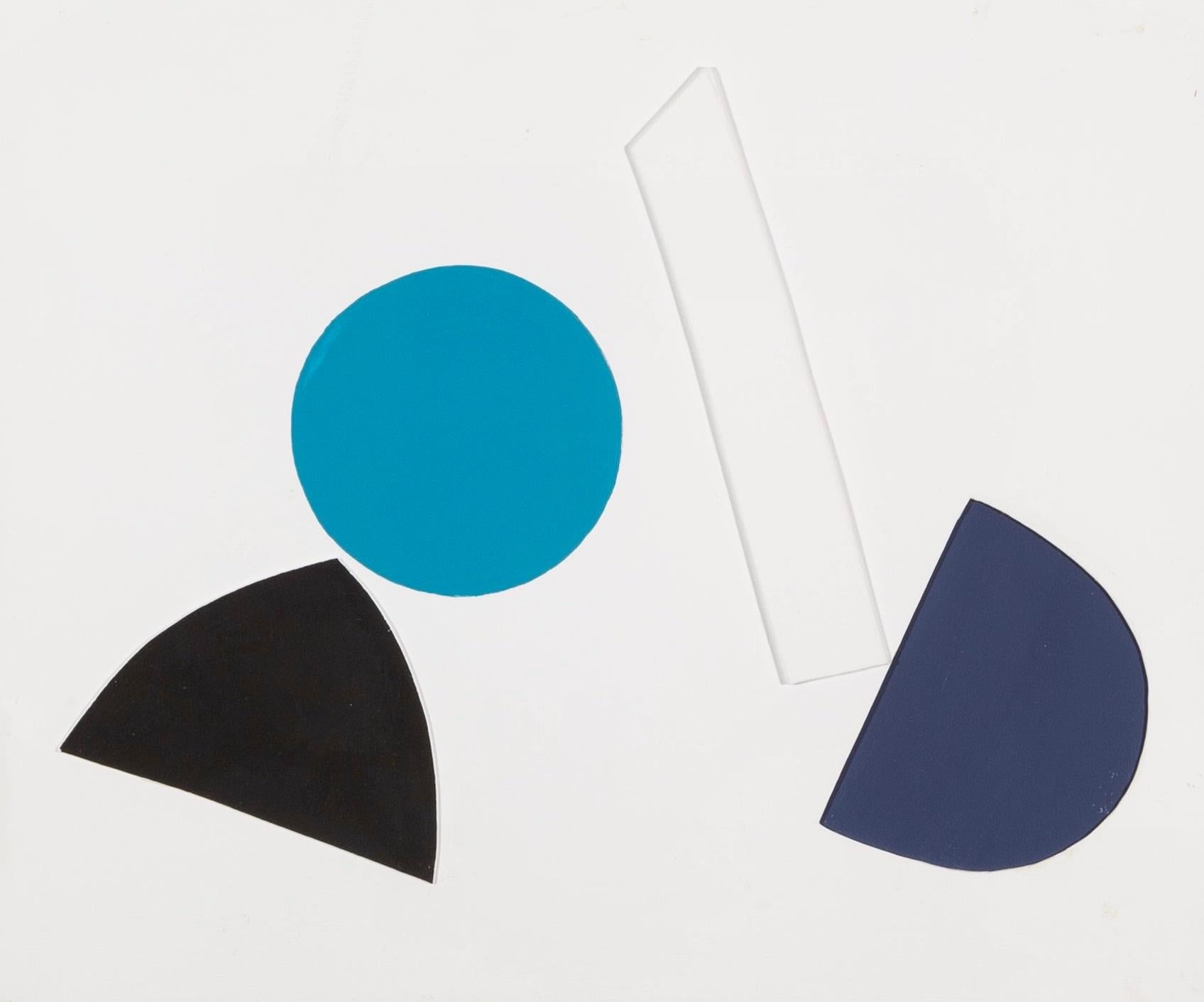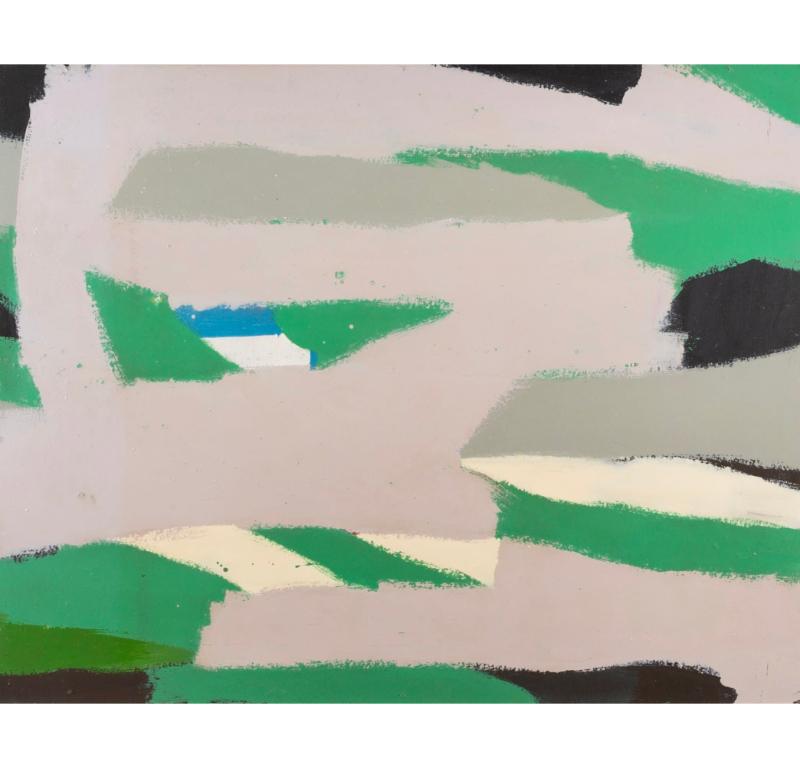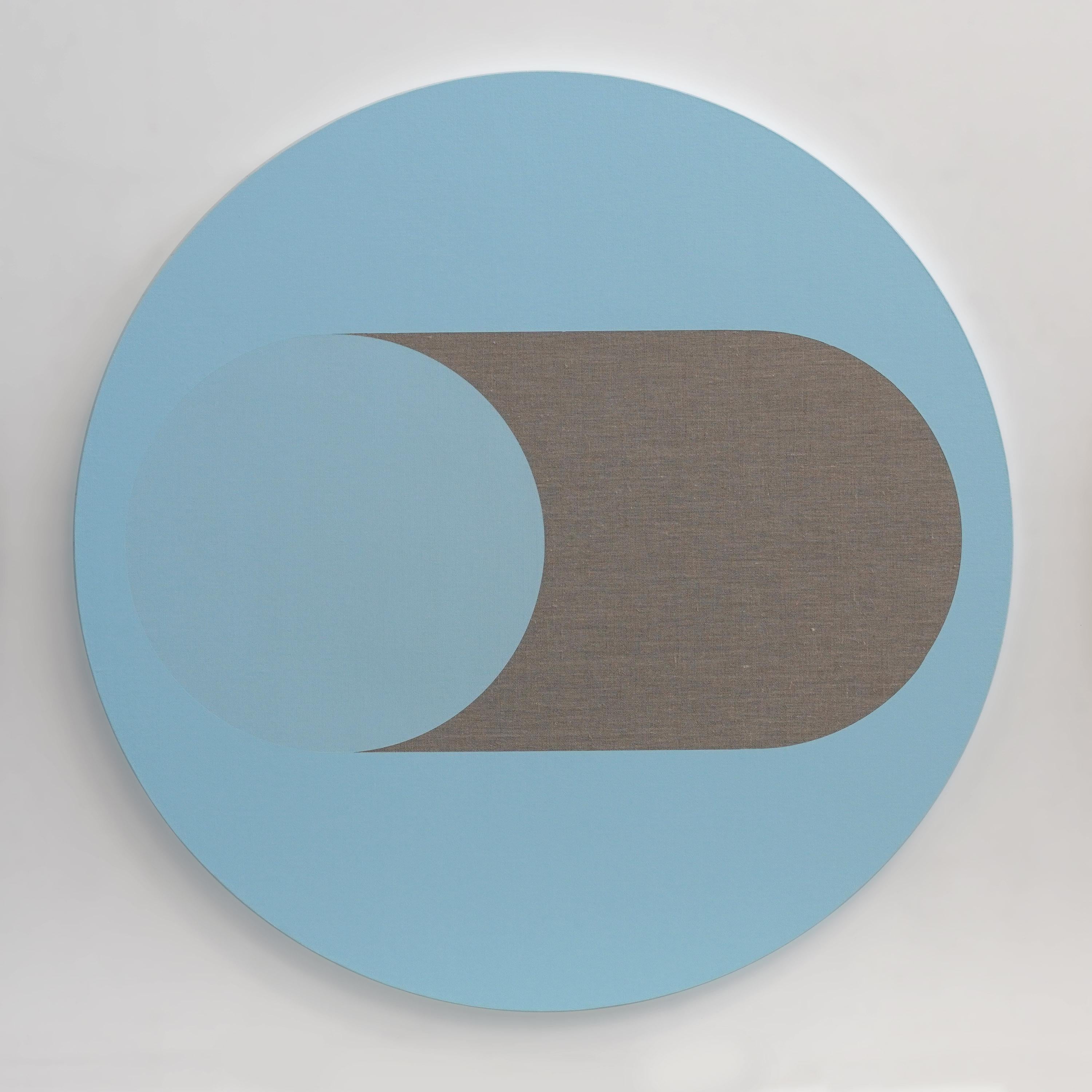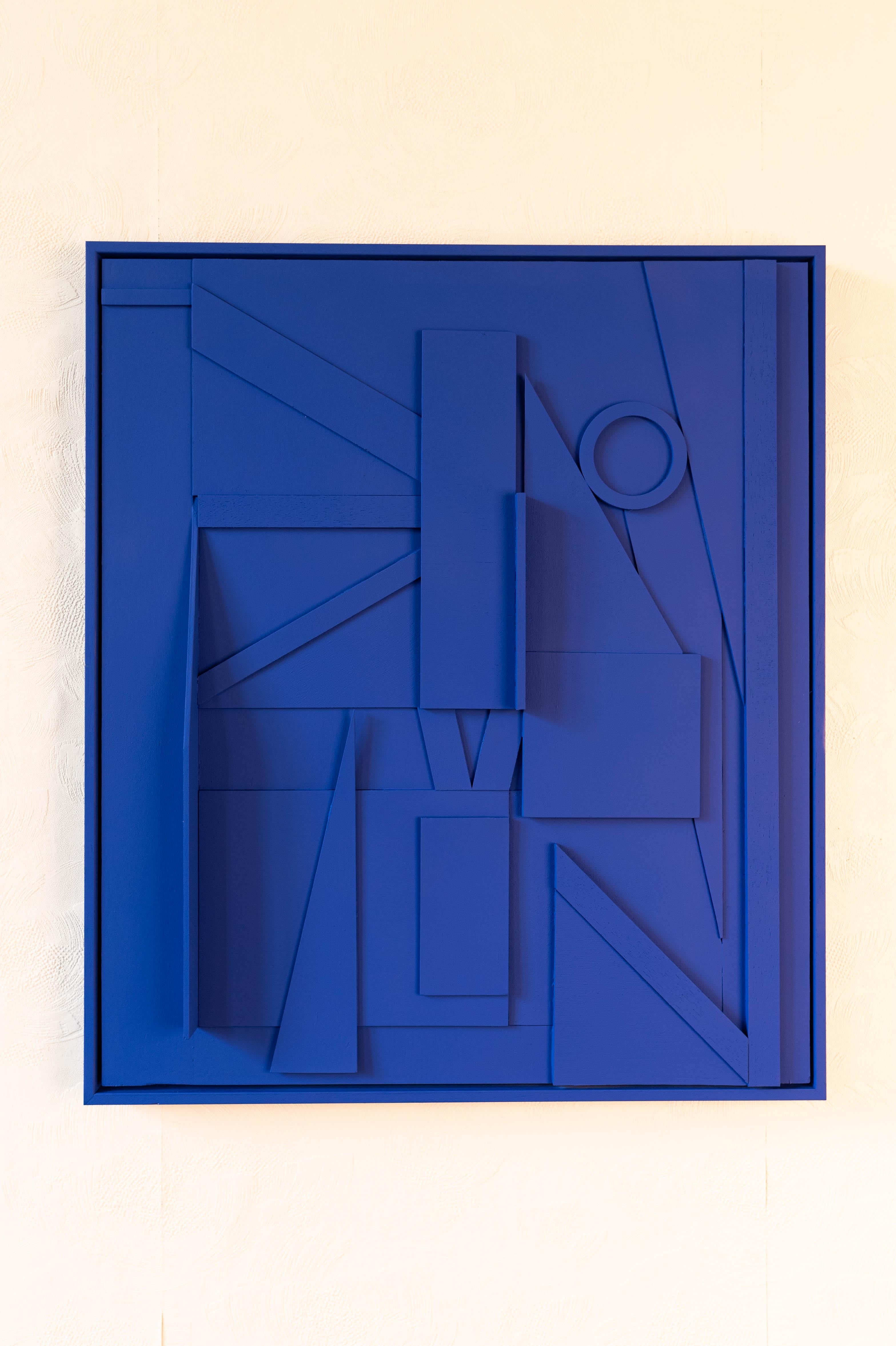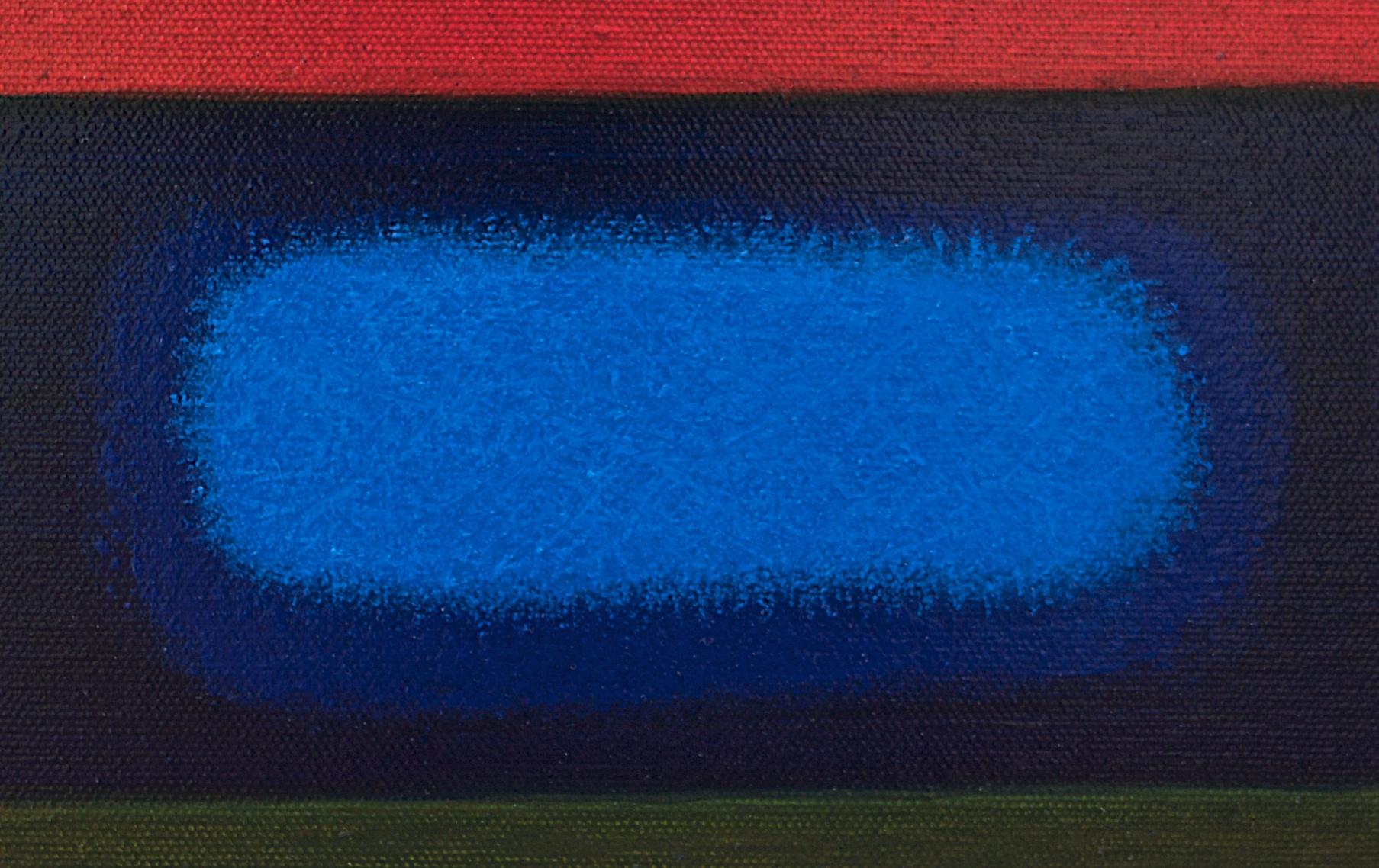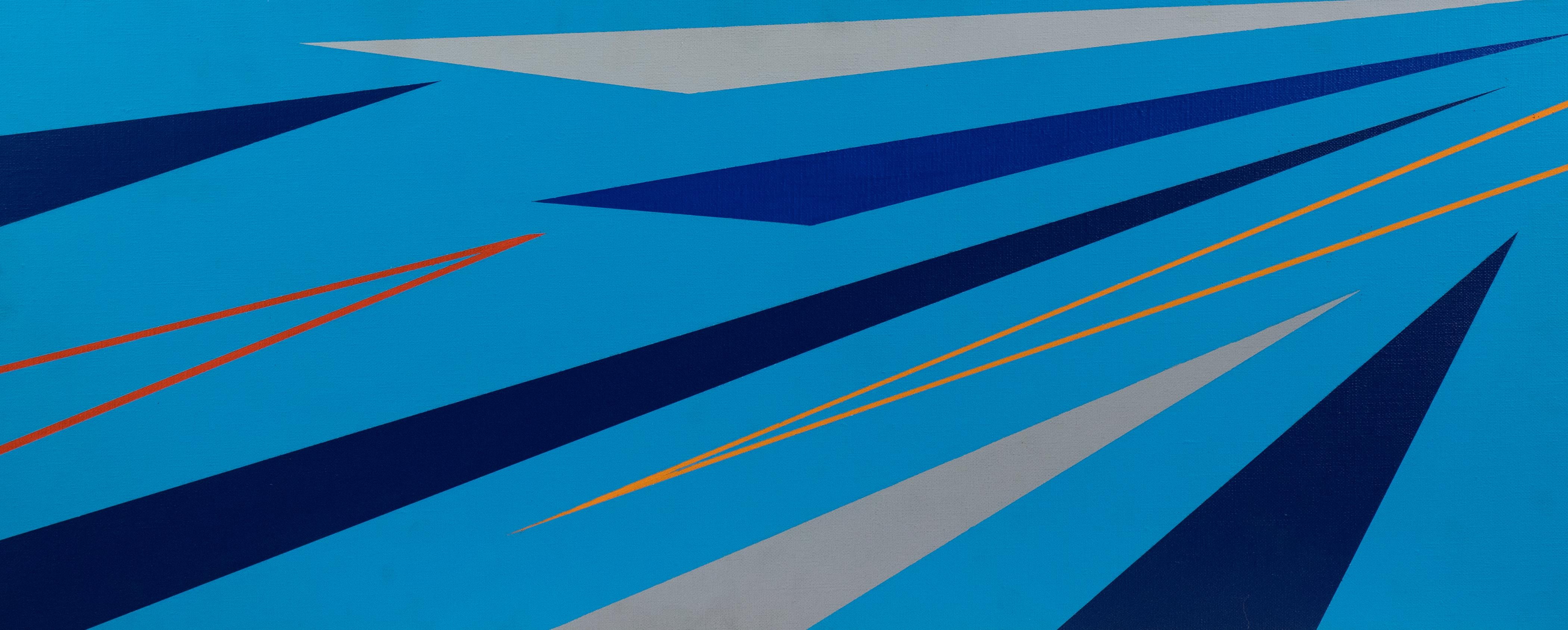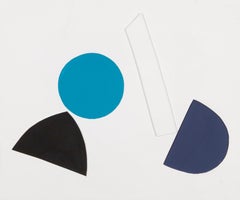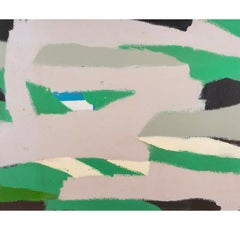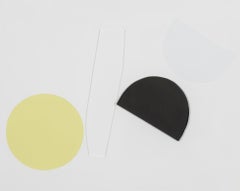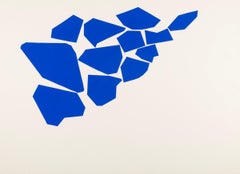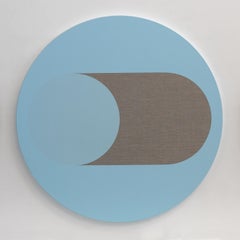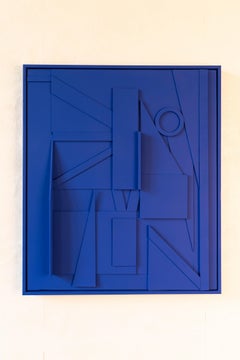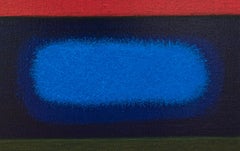Items Similar to Ascending Blue, Oil on Board, Relief Painting by Alan Reynolds, 1971
Want more images or videos?
Request additional images or videos from the seller
1 of 5
Alan ReynoldsAscending Blue, Oil on Board, Relief Painting by Alan Reynolds, 19711971
1971
Price Upon Request
Price Upon Request
Price Upon Request
Price Upon Request
Price Upon Request
Price Upon Request
Price Upon Request
Price Upon Request
Price Upon Request
Price Upon Request
About the Item
Ascending Blue, Oil on Board, Relief Painting by Alan Reynolds, 1971
Additional information:
Medium: Oil on board, relief
101.6 x 121.9 cm
40 x 48 in
Signed, inscribed and dated
With a consistent concern for formal and structural elements of composition from the outset of his career when he was producing neo-romantic landscape paintings, Alan Reynolds described his work as ‘a problem of solving equations; tonal, linear and so on’. Perhaps it is of little surprise the artist abandoned depiction in around 1968, instead seeking the ‘concrete’ image. Reynolds was always influenced by Paul Klee and Piet Mondrian, but in this example the inspiration of Ben Nicholson’s white relief sculptures is evident and is a potential foreshadowing to Reynolds’ later commitment to white reliefs. The artist favoured working in white to maximise ‘the play of light and shadow’, and in this case the overall effect is austere and emphasises the purity of his work.
In March 1952, the unknown art student Alan Reynolds exhibited thirty-four paintings at the Redfern Gallery. A decade and nine one-man exhibitions later, his work was represented in thirty important museum collections, twelve of them overseas. He was the most significant English painter to emerge in the early 1950s.
By the mid 1950s, Reynolds was fêted by critics, sought after by collectors, both traditional and modern; and he was heralded as the saviour of English landscape painting. But from the first exhibited works to his minimalist abstractions of today there is a consistent concern for formal and structural elements of composition. From the outset, he revered the art and writing of Paul Klee; and he was later indebted to Mondrian, whose transformations of trees and branches into vertical and horizontal notations were shown at the Whitechapel Art Gallery in 1955. He also studied traditional Chinese landscape painting, and his highly praised botanical studies - ears of corn, teazles and grasses - possess an exquisite calligraphic subtlety.
Certainly, as J. P. Hodin noted, Reynolds' art of 1952 displayed:
a genuine loving attachment to nature, both to landscape as a whole and to its particular shapes and arrangements, to blossoms and fruit, to grasses and weeds, to leaves and buds, to branches and twigs . . . his preoccupation was not with the grand or with the picturesque, it was not with the topographical . . . rather a penetration into the spirit of nature
Beyond mere representation, Reynolds (akin to Cézanne) imposed a strict visual order onto each specific view: the essence of the Kentish orchards, hop gardens, fields and barns was presented in formal and geometric terms - balanced triangles, circles, semi-circles, rectangles, fanshaped trees.
In 1953, Reynolds saw his painting as:
a problem of solving equations; tonal, linear and so on. The subject or motif must be transformed and become an organic whole. Poetry is never absent from Nature, but alone it cannot constitute a work of art. It must be reconciled with the elements of design and composition. Laying emphasis on the formal values in a work will therefore result in a degree of abstraction.
With the Four Seasons exhibition of 1956, Reynolds reached the apogee of his popularity, bringing the large satisfactions of landscapes into the galleries (Robert Melville). Here one could see a given naturalness of composition, a talent for transforming the visual into a vision, a searching formal inventiveness, an intuitive draughtsmanship, a fine brushwork' (Hodin).
His next show, in 1958 at the Leicester Galleries, saw a return to a more hard-edged approach, as if the work exhibited at the Four Seasons had taken him to far towards the representational. Melville noted that his paintings spring from needs that are not satisfied by the pleasures of the picturesque. These were the last pure landscapes that Reynolds was to exhibit.
He felt he was repeating himself and much of his output from 1958 and 1959 was destroyed, as he strove to find his pictorial language: in his 1960 exhibition, back at the Redfern Gallery, he presented non-figurative work, albeit with the same earthen colours and discernable shapes of landscape. To the many viewers who could not or would not accept Reynolds' volte-face from the Four Seasons pictures, the critic Pierre Rouve pointed out that Reynolds new works were:
. . . abstract only in the sense that, from his contemplation of nature, he has extracted the essential visual elements. These had always been present in his work: they were the universal core draped in individual topographical connotations . . . What is needed is an eye emancipated from the conventions of the picture postcard . . .
From 1960 to 1965, Reynolds' abstract paintings stood comparison with any advanced painting in Europe at the time: in a period of great experimentation, they were achieved with restraint, discipline, and a mastery of tonal gradation: an austerity is ever-present from the earliest landscape oils to the latest white on white abstract relief. To emphasise purity, and with music having always been important to Reynolds, this stage in his art saw the emergence of titles incorporating Composition, Symphony, Harmony, and Arrangement.
A decade on from his statement of 1953, Reynolds - despite a painterly journey that some artists might not achieve in a lifetime - was still expressing the same concerns:
I am obsessed with the horizontal and vertical as a structural device . . . I try to give poetic expression through this formal scaffolding, one which is disciplined and at the same time intuitive. Earlier my work was more obviously related to natural forms . . . however, if my painting has become more austere formally it is still concerned with poetry and it remains influenced by nature and my surroundings - for me it could not be otherwise.
Reynolds work is regularly exhibited at galleries and museums in the UK and Germany, and in 2003, a career retrospective was held at Kettle's Yard, Cambridge.
- Creator:Alan Reynolds (1926 - 2014, British)
- Creation Year:1971
- Dimensions:Height: 40 in (101.6 cm)Width: 48 in (121.92 cm)
- Medium:
- Period:
- Condition:
- Gallery Location:Kingsclere, GB
- Reference Number:1stDibs: LU2718214575942
About the Seller
No Reviews Yet
Vetted Professional Seller
Every seller passes strict standards for authenticity and reliability
Established in 2010
1stDibs seller since 2024
41 sales on 1stDibs
Typical response time: 7 hours
- ShippingRetrieving quote...Shipping from: Kingsclere, United Kingdom
- Return Policy
Authenticity Guarantee
In the unlikely event there’s an issue with an item’s authenticity, contact us within 1 year for a full refund. DetailsMoney-Back Guarantee
If your item is not as described, is damaged in transit, or does not arrive, contact us within 7 days for a full refund. Details24-Hour Cancellation
You have a 24-hour grace period in which to reconsider your purchase, with no questions asked.Vetted Professional Sellers
Our world-class sellers must adhere to strict standards for service and quality, maintaining the integrity of our listings.Price-Match Guarantee
If you find that a seller listed the same item for a lower price elsewhere, we’ll match it.Trusted Global Delivery
Our best-in-class carrier network provides specialized shipping options worldwide, including custom delivery.More From This Seller
View AllAscending, Oil on Board, Relief Painting by Alan Reynolds, 1970
By Alan Reynolds
Located in Kingsclere, GB
Ascending, Oil on Board, Relief Painting by Alan Reynolds, 1970
Additional information:
Medium: Oil on board, relief
9 7/8 x 11 3/8 in
25 x 29 cm
Signed...
Category
20th Century Abstract Paintings
Materials
Board
Untitled 01 (Blue Through), Oil on Board Painting by Barry Daniels, 1960s
By Barry Daniels
Located in Kingsclere, GB
Untitled 01 (Blue Through), Oil on Board Painting by Barry Daniels, 1960s
Additional information:
Medium: Enamel paint on board
70 x 89 cm
27 1/2 x 35 in
Barry Daniels was a member...
Category
20th Century Abstract Paintings
Materials
Board
Bergamasque (Mini), Abstract Painting by Alan Reynolds, 1972
By Alan Reynolds
Located in Kingsclere, GB
Bergamasque (Mini), Abstract Painting by Alan Reynolds, 1972
Additional information:
Medium: Emulsion on cut-out board on wood, with relief; in the Arti...
Category
20th Century Abstract Paintings
Materials
Emulsion
One Two Three (Cobalt Blue) by Robert Goodnough, 1968
By Robert Goodnough, 1917-2010
Located in Kingsclere, GB
One Two Three (Cobalt Blue) by Robert Goodnough, 1968
Additional information:
Medium: screenprint
56 x 76 cm
22 1/8 x 29 7/8 in
signed, dated and numbered in pencil
Robert Goodnoug...
Category
20th Century Abstract Prints
Materials
Screen
II (Blue), from The Paramount Suite by Robyn Denny, 1969
By Robyn Denny
Located in Kingsclere, GB
II (Blue), from The Paramount Suite by Robyn Denny, 1969
Additional information:
Medium: screenprint, to the edges
66 x 86.4 cm
26 x 34 in
signed, dated and numbered 7/75 in pencil
...
Category
20th Century Abstract Prints
Materials
Screen
Blue/Red Ornament Frieze II, 1976-77 - Large Bold, Bright Abstract Painting
By Gordon House
Located in Kingsclere, GB
Gordon House 1932-2004
Blue/Red Ornament Frieze II, 1976-1977
with Artist's label attached to the stretcher bar
acrylic on canvas
91 x 91 cm
35 7/8 x 35 7/8 in
Gordon House was born in 1932 in Pontardawe, South Wales. Early exposure to art on trips to the Glynn Vivian Art Gallery as a young boy inspired House towards creative endeavors and at the age of fourteen he was awarded a grant to enter art school which he accepted. From 1947 to 1950 he studied at Luton School of Art, Bedfordshire, and St. Albans School of Art, Hertfordshire. House's contemporaries included Richard Smith and John Plumb with whom he remained close. During the early fifties, after finishing art school, House began work as assistant to the ecclesiastical sculptor Theodore Kern. He also spent time at an advertising studio where he honed his burgeoning skills in typography and graphic design. In 1952 House was offered the position of designer for Imperial Chemical Industries Plastics Division where he stayed until 1959. This was followed by two years spent as graphic designer for the Kynoch Press in London. In 1961 House set out on his own as a self-employed designer and typographer. Initially this was supplemented by part-time teaching at art schools in and around London but by 1964 House was able to devote himself entirely to his design work which freed up valuable time to concentrate on his own artistic output in the studio.
In the late fifties, informed by the new art emerging from America and that of his contemporaries in England, House began to create large-scale abstract works which he was invited to show in 1959 at Dennis Bowen's legendary New Vision Centre in Marble Arch.
House was an active participant in the vibrant London art scene of the sixties, regularly attending lectures, exhibitions and discussions. In 1960 he exhibited in 'Situation' the key abstract exhibition of the decade held at the RBA Galleries. Other participating artists included Robyn Denny, Bernard and Harold Cohen, Gillian Ayres, John Hoyland, Richard Smith and William Turnbull among others. These artists, united by a common admiration for American Abstract Expressionism, were frustrated by the lack of exposure given to large-scale abstract works in commercial galleries so they organised their own exhibition. The name was derived from the participants' idea that an abstract painting that occupied the whole field of vision would involve the spectator in an 'event' or 'situation'. This exhibition was followed by 'New London Situation' in 1961 and a nationwide touring Arts Council presentation in recognition of the significance of the two earlier shows.
In 1961 House began producing his first prints at the Kelpra Studio, run by Chris and Rose Prater, where he made the earliest fine art screenprint ever to be produced in Britain. Artists such as Paolozzi and Hamilton followed in his footsteps and together they started a printmaking revolution in Britain. They cemented the medium of the screenprint in the world of fine art as opposed to the commercial sphere and secured the reputation of Kelpra in the process. Later, together with Cliff White, House set up the White Ink (Ltd.) print studio in London, where he produced etchings and wood engravings on a series of magnificent antique printing...
Category
20th Century Abstract Geometric Paintings
Materials
Canvas, Acrylic
You May Also Like
The Skies of Sky #2 (blue)
By Louise Blyton
Located in Phoenix, AZ
b. Melbourne, Australia
Louise Blyton is a reductive artist exploring the romance of raw linen and dry pigment. The artist’s geometrically shaped canvases explore color, light, and form through the visual language of Reductivism, an aesthetic style characterized by streamlined compositions, restricted color, and a reduction of form and means. Identifying with Reductivism’s simplicity, Blyton’s shaped canvases and three-dimensional wall sculptures elevate craftsmanship and process, achieving a compositional clarity that unifies color and form.
To construct her works, Blyton covers custom built balsa wood stretchers with raw linen, adorning them with layers of pure pigment or acrylic paint. Each pigment reacts differently to raw linen and requires a specific number of coats to reach the artist’s desired level of saturation. As the artist explains, “I’m always looking for a kind of quietness and harmony when making my works even if the color being used is loud.”
The artist creates her own spatial dimension by manipulating the shape of the canvas, which escapes from the flat surface of the wall, confusing its role as a painting. “Rather than responding to the architecture they ask particular attributes of the building to act as support,” as some works appear to climb the surface of the walls, while others straddle columns and corners.
Louise Blyton lives and works in Melbourne, Australia. She graduated with a Bachelor of Fine Art at RMIT University, Melbourne, Australia in 1988. Her works are held in significant corporate and private collections in Australia, China, France, United Kingdom, Portugal, and the United States. Since 2000, Blyton has run an artist supply store called, St. Luke Artist Colourman, which specializes in professional paint and raw materials, with her husband David Coles.
Category
2010s Abstract Geometric Abstract Sculptures
Materials
Linen, Acrylic
Abstract acrylic on wood painting in royal blue, called Number 46
Located in Oostende, BE
Abstract acrylic on wood painting in royal blue, called Number 46
Category
2010s Abstract Geometric Abstract Paintings
Materials
Wood
BLUE DEPARTURE, Painting, Acrylic on Canvas
By Rich Moyers
Located in Yardley, PA
OIL PASTEL OVER ACRYLIC painted on a 1 3/8" Deep x 8" x 10" Gallery Wrapped Canvas. The Sides are painted Black and an Archival Varnish coating has been applied. It is Signed by th...
Category
Early 2000s Contemporary Paintings
Materials
Acrylic
Blue Composition - Oil on Canvas by Marcello Grottesi - 1977
Located in Roma, IT
Blue Composition is an original abstract artwork realized by Marcello Grottesi in 1977.
Oil on canvas.
Hand-signed and dated in light-blue color on the back.
The artwork has been...
Category
1970s Abstract Abstract Paintings
Materials
Canvas, Oil
ASCENSION - 3D Modern Painting & Construction, Painting, Acrylic on Canvas
By Rich Moyers
Located in Yardley, PA
Three Dimensional Modern Painting / Construction SERIES: "Dimensional Abstracts" MATERIALS: Gesso, Acrylic Paint, on 12 x 12 Inches Pintura Canvas Panel + 9.65 x .250 x .125 In...
Category
2010s Modern Paintings
Materials
Acrylic
Painting by Janet Lippincott, 1975, Acrylic on Linen
Located in Dallas, TX
“My art is all I can give to the world, it is all I have to offer.” Abstract painting by Janet Lippincott, 1975, acrylic on linen.
Born in New York in 1918, Lippincott had attended t...
Category
1970s Abstract Paintings
Materials
Linen, Acrylic
More Ways To Browse
P English Paintings
Framed Vintage Botanical Art
Framed Relief
Orchard Painting
20th Century Oil Paintings China
Oil Painting Orchard
Blue And White China English China
Oil Paintings Signed Reynolds
Large Vertical Landscape Oil Paintings
Paul Revere
Vintage Scaffolding
Paul Revere Painting
Abstract Painting 1971
Alan Reynolds
George Newman
Katherine Jackson
Laura Park
Peter Max 1981
